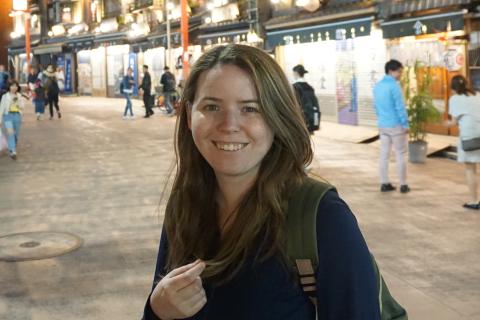Maggie Le
Editor (Kodansha), Penguin Random House
UW Majors: Japanese and Journalism
1. Tell us a bit about your job (e.g. what kinds of things you’re working on, what types of problems you solve day to day, etc.)?
I am an Editor for Penguin Random House Publisher Services, localizing manga for Kodansha. Manga, like many other forms of Japanese pop culture, is the catalyst for countless individuals to pursue studies in Japan. As editor, I am basically a project manager for a huge and growing catalog of manga titles published in English for our client, Kodansha. I work with translators and letterers to localize Japanese comics, making sure it is faithful to the source and understandable to English readers. Before this, I worked for several years as the JET (Japan Exchange & Teaching) Program Coordinator and the Educational Affairs Specialist for the Consulate-General of Japan in Seattle. My main focus in that role was on international exchange programs and involved recruitment, application screening, interviews, and pre-departure preparations for about 50-80 individuals every year via Seattle, with about 1,000 nationwide. I greatly enjoyed working in public service, and I took seriously the responsibility of making sure each participant understands that the program is a chance for them to experience grassroots international exchange or citizen diplomacy. Now that I have transitioned to the private sector, I am happy to be able to continue engaging US-Japan relations through a medium of storytelling that can bring others closer together.
2. How do you think your humanities education has influenced/advanced your career path?
My career has involved the importance of community. Humanities is the study of basically us - how culture, traditions, language, and society interact with the intricate fabric of history. One of my first courses I took as an undergraduate at UW was an Asian American Studies course. Through hearing and reading stories of the struggles and triumphs, it helped me understand and appreciate the efforts in the Japanese and Japanese American community in Seattle. I learned about my fellow classmates - a majority of whom were Asian Americans - and what they overcame to study at the university. I could understand more about my friends. It helped me advance my empathy skills and it is something that I still reflect on to this day - more than 10 years later.
These skills were essential to me when I began work in public service. While the Consulate-General of Japan in Seattle's main mission is to assist Japanese nationals living in the U.S., as a member of local staff, we make sure to not forget about conveying the importance of the Japanese American community when planning for events and organizing programs. Many of our Japanese diplomats do not know much about Japanese American history when they first arrive for their post and are always amazed to see the customs and language thrive in its own way in the region as well as the community's resilience from systemic racism and hardship.
My humanities education at the UW taught me empathy and to look deeper into an issue. In my work as an editor, I am very fortunate to work on a team that is socially conscious, kind, and diligent, who are determined to bring different perspectives and stories through an accessible format. So far, my favorite series I have been a part of is Perfect World, which has the theme of love overcoming obstacles. In this case, a young woman who reunites with her high school crush who now uses a wheelchair due to an accident. Without my humanities education, working with such sensitive material and managing the nuance between the English and Japanese language and their respective societal contexts would not have been possible.
Want to read more? Check out the profiles on the Humanities Alumni Careers page for more information on what our humanities majors are up to.
